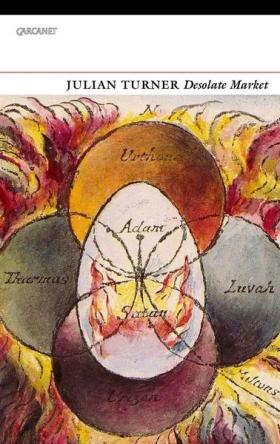Julian Turner’s fourth collection, Desolate Market, takes its name from William Blake’s unfinished epic The Four Zoas, in which an apocalyptic, or fallen, state is prophesied where “The heavens shall quake” and the woods and valleys will ‘wail in dismal fear. In this collection we also get images of a world, in not as necessarily dismal state as Blake’s, but a state of disjoint nonetheless. Isn’t state a fittingly ambiguous term though? As well as being defined as “territory” it can also be a “mode or condition of being”. Think of these definitions, or the elasticity of them, when you read the first stanza of “Local God”:
Britain assembles as a continent
volcanoes vent
and mountains grow to Alp height,
glow a moment then wash away.
Nominally this state has been identified as Britain, but then what kind of state must one be in to be perceiving it like this? Through Turner we see this strange connection with the environment develop. This desire to connect might stem from something Romantic, but the genealogy isn’t an organic one. Instead it’s a tension, that if we’re to understand the environment as somewhere for the poet to project onto we have to question is it the poet, or the environment that is being subject to this distortion.
Here, we could momentarily turn our attention to Blake again, in particularly to Northrop Frye’s reminder that images of his poetry shouldn’t be “regarded as a flagrant misuse of ‘pathetic fallacy’” and that “the ‘states’ Blake deals with can seldom be identified with…a political event.” We see more than just an apropos to Blake in the light of this commentary. Turner strives for more. How the political landscape might try to impress itself on your tired mind as you read, but something like Brexit would, could, only be a portion of the explanation in Turner’s poetry. You’ll see instead a wish to connect, almost a belief, that despite this fractured world, things can still be whole.
The ability to allegorise seamlessly then with the environment does not make this a simple task, as dark, gothic imagery entwines with lyrics that explore subject matter like schizophrenia. There’s something in the corruptive description of it that is strikingly obvious though, that you perhaps wouldn’t expect of somebody who is also a counsellor. This is from “How Operators Make You Do (1958)”:
The Box is everything – inside its cool
jet surface, something stirs. My smallest thought
is taken by its wavy lines that wash
into my skull and scoop my brain out
Doesn’t the “scoop my brain out” seem too macabre for a subject like mental health? Perhaps this obviousness is an intentional misuse of a fallacy as Frye might say, because when we get to a poem like “The Hook”, we begin to see, when we strip away the overt voices and imagery, what other designs might be at work. Starting with the lines “I may no longer be held to account / for that person’s fear of leaves,” the speaker recognises the “person” as the person that they have instilled fear into and cannot look at them without seeing the fear that grows inside them “like a large tree.” The poem then finishes with the stanza:
Regret is a sweet word. I can
not utter it all and know
what manner of sorrow and shame
may visit me. I feel a weight
of blossom as big as space.
There’s something to be said here for Turner’s mastery of the internal rhyme “know” and “sorrow” resonate – as if remainders of – the internal voices powerfully, and loudly, rendered in “Black Box”, but it’s the fact sorrow and shame arrive at the speaker and “visit” him that echo so clearly from this. Emotions are external and otherly where elements of the environment “blossom” internally instead. In this state of inversion then, growth, edified by the blossom and the large tree, has become occlusive and inhibiting. And with that pun on “leaves” and “large tree” in the first stanza, one has to wonder what has happened in the world to make it so.
The disassociation Turner feels might see him have an unexpected contemporary in somebody like Lord Byron. Adam Phillips, the psychoanalyst and writer, discusses how for Byron “it [nature] was clearly not alluring – or rather, it was a temptation to be avoided…” as Byron separated himself from his romanticist contemporaries and instead it was “sexuality [that] seemed to him more revealing than mountains and lakes.” Yet it doesn’t seem to be sexuality that is more revealing to Turner, but trauma, and where Blake saw poetry as the potential for a “perfect unity” it is perhaps a perfect disunity that Julian Turner yearns for here.
Julian Turner. Desolate Market. Manchester: Carcanet Press, 2018.
Liam Bishop is a writer from Leeds, UK. For a directory and selection of his other writing, please visit his website www.curbcomplex.com.


Pingback: Desolate Market – Rob Turner – writer
Pingback: Review: Desolate Market by Julian Turner – curb complex